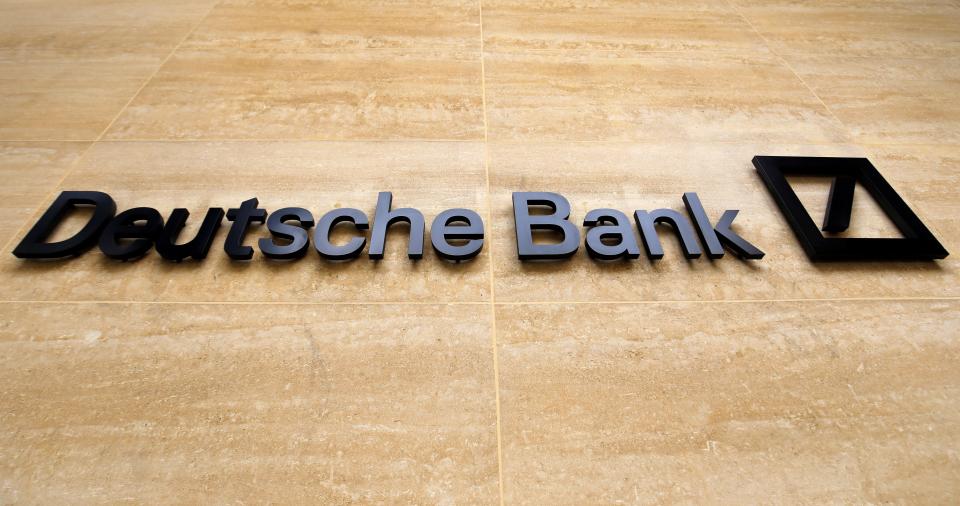Doom and gloom for bankers as job cuts recall 'dark days of 2008'

Thousands of jobs are being cut at investment banks and finance firms globally as the industry grapples with one of the worst jobs crises since the financial crash.
Deutsche Bank (DBK.DE) became the latest major firm to swing the axe this week, announcing 18,000 job cuts globally by 2022.
Deutsche Bank faces many company-specific issues that have dogged the company for years. But it is also battling industry headwinds that have forced rivals to cut jobs too. Societe Generale (GLE.PA), HSBC (HSBA.L), and Nomura (8604.T) have all let staff go this year, collectively amounting to thousands of lost jobs in the City of London.
READ MORE: What's driving Deutsche Bank's huge jobs cull and what investors think
“These kind of job losses in the City are reminiscent of the dark days of 2008 and Lehmans,” Neil Wilson, the chief market analyst at Markets.com, said in an email on Monday.
Big banks are battling weak global stock markets, a squeeze on fees, and increased competition from non-banks. Other parts of finance are also feeling the squeeze and the bankers who have been laid off so far this year may be forced to re-invent themselves as they hunt for new jobs.
‘Outlook taken a turn for the worse’
“We haven't seen the investment banking revenue pool growing in many years,” Jon Peace, the managing director of European Banking research at Credit Suisse, told Yahoo Finance UK.
Big banks have been battling falling revenue pools for years and the last 18-months have been particularly bad. There has been a slump in companies going public and a decline in equity trading due to the US-China trade war, which has put off many investors.
European investment banking revenues fell by 23.1% to $10.5 billion in the second quarter of 2019, according to data provider Refinitiv. Revenue from debt and equity transactions both fell to a 3-year low.
“Markets and fee income look weak with no real basis to call for a near term change in fortunes,” UBS banking analyst Jason Napier said in a recent note on the sector.

In fact, “the outlook for bank revenues has clearly taken a turn for the worse,” Napier wrote, due to recent signals from central banks around the world that they are likely to cut interest rate. In basic terms, lower interest rates are bad for banks because they squeeze the spread they make on loans — the difference between the interest they make loaning money and the interest they pay to depositors.
European banks have been particularly hard hit by rates in the post-crisis era. The ECB has held the headline interest rates at 0% since the crisis, while the Bank of England has only just reached 0.75% and now looks likely to cut rates.
READ MORE: Bank of England holds interest rate at 0.75% as 'downside risks' increase
“In a world that is starving for yield, it seems harder than ever for bankers to make profits,” Mati Greenspan, a senior market analyst at trading platform eToro, said. “This is the direct result of a full decade in which global central banks have kept interest rates near or below zero.”
US banks have had a better time of it thanks to rates rising to 2.5% and a swift and aggressive bailout package in the wake of the financial crisis.
But even the American big beasts have been reinventing themselves to survive in leaner times. Goldman Sachs (GS), once the sharp-elbowed investment bank of the ultra-wealthy, is transforming itself into a retail business and tech platform to tap into new markets. It has also started paying a healthy dividend to help keep interested.
“When even a 2% annual return starts to look incredibly attractive, it's clear that there's very little meat on the bones,” Greenspan said.
‘An industrial revolution’
As well as declining client activity and poor market conditions, big banks also face increased competition.
“Margins have been squeezed by the electronification of trading and competition from non-bank players,” Peace told Yahoo Finance UK.
Like every other industry over the last decade, technology has transformed finance. Electronic trading has made it easier for people to trade stocks on their computer without going through a broker.

The boom in fintech —financial technology— has also created a raft of specialised players doing everything from small business loans to money transfer to current accounts.
Post-financial crisis regulation intended to stop another spectacular blowup has made it more expensive for banks to do business, meaning these fintechs can often undercut them on price.
READ MORE: Societe Generale cutting 1,600 investment banking jobs in London, Paris, and New York
UBS’ Napier said in a recent not “global banking is undergoing something of an industrial revolution.”
“As regulators work to lower barriers to entry in many parts of the world – issuing digital banking licences, opening up third party access to customer data through Open Banking and other similar initiatives – the cost of technology for start-ups is collapsing, customers are becoming increasingly comfortable with digital self-service, and big tech and other firms are increasingly active in financial services,” he and his team wrote.
Fall in jobs
It’s not just big banks who are having a tough time of it. The same poor market conditions — plus new European regulations forcing firms to pay for each piece of research they get — has left London stockbrokers in a “fight of survival,” according to the Financial Times. Even some of the new-fangled fintechs are putting out profit warnings as global growth slows.
The segment of finance that has arguably done best in the decade since the financial crisis is asset management. The assets of non-bank financial institutions have grown by over 50% since 2008, according to Deutsche Bank.
But even here, there are challenges. The growth of low fee exchange traded funds (ETFs) has squeezed margins and reduced the appeal of active managers. Competition has also increased as the likes of UBS and Credit Suisse have doubled-down on their wealth management businesses.
READ MORE: 'Dramatic decrease' in finance jobs as Deutsche Bank swings axe
All of this has left the global financial sector in arguably its worst state since 2008 — at least when it comes to jobs and optimism. The number of new jobs in London’s finance sector has been steadily declining for two years, according to recruiter Morgan McKinley. Brexit is a factor, but the trend points to the broader direction of travel in the industry.
This is more bad news for the Deutsche Bank staff let go around the world on Monday, and the others who may face the cut in the coming months. They are entering a shrinking jobs market with a growing pool of applicants.
————
Oscar Williams-Grut covers banking, fintech, and finance for Yahoo Finance UK. Follow him on Twitter at @OscarWGrut.
Read more:
What's driving Deutsche Bank's huge jobs cull and what investors think
'Dramatic decrease' in finance jobs as Deutsche Bank swings axe
Investor anger at Sainsbury's boss pay after Asda deal collapse

 Yahoo Finance
Yahoo Finance 